Gaining an accurate understanding of context is critical to successfully plant a new church. Barry Whitworth, has led in establishing over thirty Multiplying Church Centers in Pennsylvania, and developed a simple methodology to assist a planter in understanding their context. How to Exegete a Community Only when you are personally engaged with a community can you truly determine how best to serve it.
A) Social:
Social structures have vital information to accurately understand how relationships are understood by the culture. Observation: • What kind of interaction is happening between different generations, ethnic groups, etc.? • What groups are slipping between the cracks? • How do people connect? • Are they open to interaction with outsiders? • Who is influential in: business, financial, government and civic organization? Conversation:• Talk with gatekeepers about the health of community relationships, as well as what is ‘going well’ or could be ‘improved’. • Ask about social problems. • Ask who lives in the community. • Determine common lifestyles and worldviews.
Social structures have vital information to accurately understand how relationships are understood by the culture.
Implementation:• Of the gatekeepers, I found these people _____________ to be open to help us in building strategic relationships with the community. • To reach a particular group of people, I would recommend building a relationship with ____________. • To become socially accepted into the community a new person would be wise to ___________, and to avoid _____________.
B) Economic:
People always invest their time and money in what they deem as important. Therefore, examining the economic implications of the context is vital. Observation: • What evidence of wealth and prosperity do you see? • Is the community growing, stable, slowly declining or rapidly dying? • Who determines public agendas? • What are strengths or weaknesses in public schools, housing, police services, healthcare and recreation? • Is assistance for the needy provided? • Do people own boats, pools, or other distinguishers? Conversation:• Ask, “If your community had extra money how would you like it invested?” • What does an average workweek look like? • What is the average commute? • Ask school personnel, “How actively do parents participate?” • What are popular entertainment venues?
People always invest their time and money in what they deem as important. Therefore, examining the economic implications of the context is vital.
Implementation:Because the people of the area value ____________, a way to build relationships would be ______________. • A church planter who enjoys these activities _____________ would be an asset to build relational bridges. • Because of the strength and stability (or instability and decline) of the economy I recommend that we _____________, and we never _____________.
C) Physical:
When trying to determine the location of a new church, it’s important to notice any geographic boundaries. What does the landscape tell you? Observation: • What are some public areas? o Are they well kept? o Who are they for? • Are there areas avoided by some residents? • Does a railroad track, river or mountain separate communities? • Where are schools located? Conversation:• Take public transportation, and ask why others use it. • Ask questions to see if people are familiar with certain areas. • Ask if there are any areas to avoid? And why?
When trying to determine the location of a new church, it’s important to notice any geographic boundaries. What does the landscape tell you?
Implementation:• A way to build a bridge in this community could be through a service project ________________. • A church plant can reach a maximum radius or geographic area of ___________. • I found boundary lines of ____________ (geographic, transportation, or other). • We need other plants in _____________ and _____________ because of ____________.
D) Spiritual:
How has the community historically engaged spiritually (not just to evangelicals) and how is that affecting them currently? Observation: • Are Christian churches growing, or declining? • How many are evangelistic? • What are “spiritual” places in the community besides churches? • Are there Christian schools, non-profits or para-church organizations? • Have you noticed any “people of peace”? Conversation:• When visiting a Christian church ask: o “What has affected the spiritual climate, either positively or negatively?” o “What are hard to reach demographics?” o “What is the average age?” • Ask residents, “Where are places of life, hope and beauty in the community?”
How has the community historically engaged spiritually (not just to evangelicals) and how is that affecting them currently?
Implementation: • I believe the spiritual climate is _____________. • There are deep spiritual wounds in this community from ___________. • I would recommend concentrating on ____________ and avoiding _____________. • Persons of peace I discovered were ______________. • The most underserved and spiritually hungry demographic is ______________.
Published September 10, 2015

